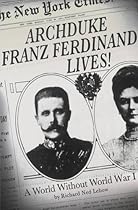Archduke Franz Ferdinand Lives!: A World without World War I

| Author | : | |
| Rating | : | 4.68 (832 Votes) |
| Asin | : | 1137278536 |
| Format Type | : | paperback |
| Number of Pages | : | 256 Pages |
| Publish Date | : | 2014-06-12 |
| Language | : | English |
DESCRIPTION:
Alternative history research Through research to how to analyze alternate history. However, no research was conducted on the author's writing about who Christians and conservatives are and what their beliefs are. Do as through an investigation on them as you did elsewhere, your best and worst scenarios would change if you did.. Some Worthwhile Nuggets But Often Boring Randy Stafford Professor Lebow's book contains something to interest everybody and, as a total package, will probably satisfy few.The veteran reader of alternate histories will get impatient with the length of the first chapter explaining the idea of counterfactuals and the place of contingency in history.The reader interested in World War I will find too little following the "sharp agate point" (to borrow a phrase from Winston's Churchill's foray into alternate history) on which Lebow's worlds deviate from ours.The three alternate histories Lebow gives us when World War I fails to occur seem too little developed and too heavily emphasize the plac. Extremely poorly organized, not well-researched Miranda What If books are a common thing anymore, and a world without the world wars is a common topic in them. Lebow takes a different tack than I've seen before. What I've read prviously makes me think that Germany and Austria-Hungary would have used any slight pretext for war, and lacking a good one would have created one themselves. Lebow sees them as more cautious but doesn't ever explain way.Organization is a big problem in this book. The very last chapter "A Look Back at the Real World" actually focuses mainly on the What If world, and rather than summarizing and strengthening his positions he uses it to bring up topics he's barely a
He lives in London, England and Etna, New Hampshire. He is also a bye-fellow of Pembroke College at the University of Cambridge, and the author of almost 30 books. His work has been cited in The New York Times , The Wall Street Journal , and The Economist , and he has been interviewed on NPR, the BBC, CSPAN, and German, French, and Italian radio and television. Richard Ned Lebow is professor of International Political Theory
One hundred years later, historians are beginning to recognize how unnecessary it was. In this highly original and intellectually challenging book, he constructs plausible worlds, some better, some worse, that might have developed. He illustrates them with "what-if" biographies of politicians, scientists, religious leaders, artists, painters, and writers, sports figures, and celebrities, including scenarios where: there is no Israel; neither John Kennedy nor Barack Obama become president; Curt Floo
Can there be a book that better explains why the counterfactual matters?” Robert Cowley, editor of the WHAT IF? Series“This is a thoughtful, insightful and provocative study which will intrigue a broad range of readers. So, what if there had been no First World War? Lebow imagines the best and worst plausible worlds…. That lesson is particularly relevant today and Lebow is to be congratulated for presenting it so effectively.” Kenneth S. At its core, Alternate History has always been an intriguing chance to ponder "what if?" Through Lebow's work, we may see further through analysis that we can apply to our own world and judge our own trends in culture, and science, and political leadership.” BlogCritics“Lebow has written a sharp… work that many with an i
